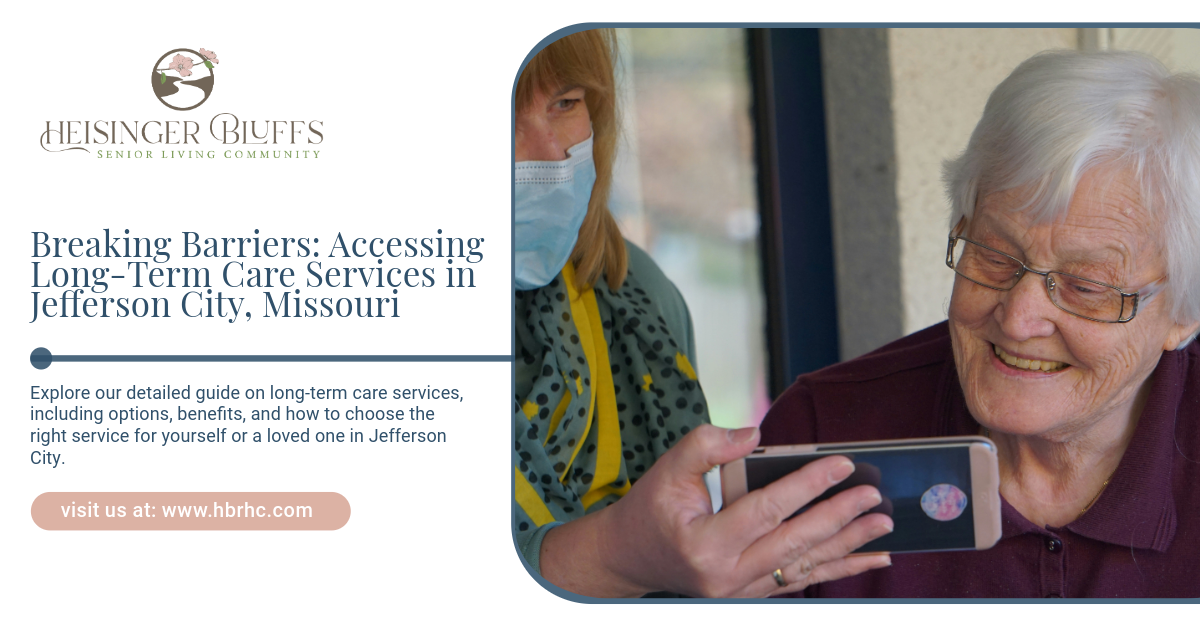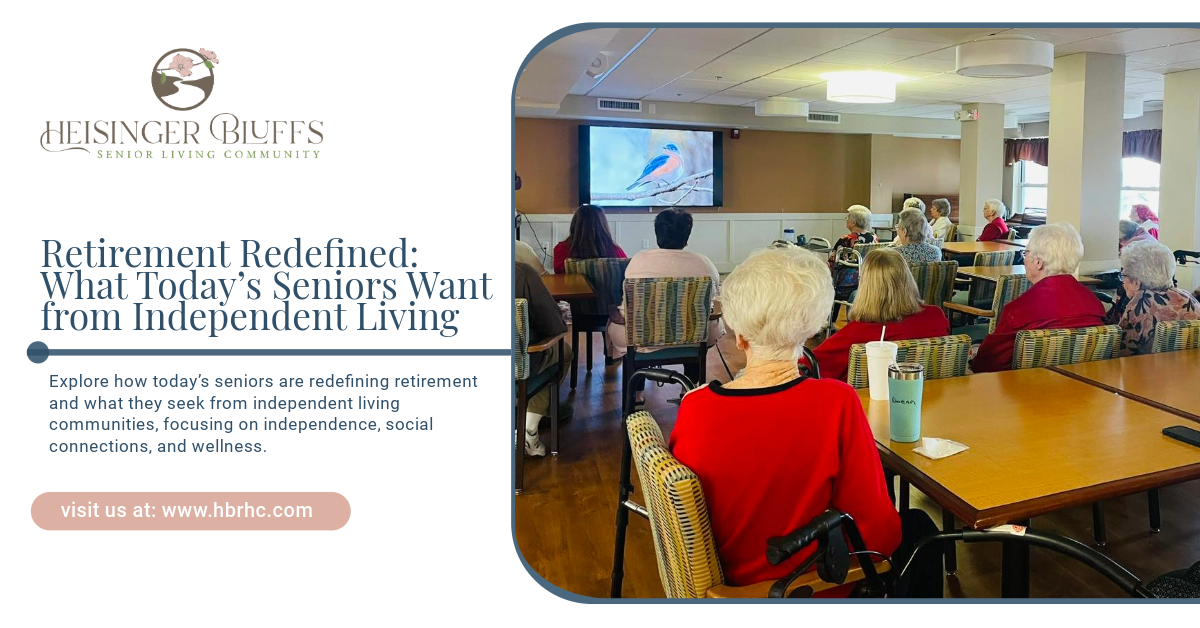Get in touch
Breaking Barriers: Accessing Long-Term Care Services in Jefferson City, Missouri

Understanding Long-Term Care in Jefferson City, MO
As we delve into the realm of senior care in Jefferson City, Missouri, it's essential to gain a comprehensive understanding of long-term care services. These services are designed to support the elderly or those with chronic health issues who require sustained assistance with their daily activities.
Defining Long-Term Care Services
Long-term care services encompass a broad spectrum of care and support tailored to meet the long-term needs of individuals who are unable to perform everyday activities independently due to physical, cognitive, or mental disabilities or conditions. These services can range from home-based care to full-time care in a specialized facility.
In essence, long-term care services are provided to enhance the quality of life and uphold the dignity of individuals by addressing their physical, social, and emotional needs. Personalized care plans, therapeutic interventions, and support services are integral components of long-term care, aiming to offer a holistic approach to the individual's well-being.
The Role of Long-Term Care
The primary role of long-term care is to support individuals in leading a safe, independent, and dignified life as much as possible. These services play a pivotal role in aiding individuals to live independently in their homes, which can delay or sometimes prevent the need for more intensive care in a long-term care facility.
Government-funded and regulated, long-term care services cater to those with complex medical needs who require round-the-clock care and supervision. These services are essential for people who are no longer able to safely reside at home due to significant health concerns that demand professional care and support on a continuous basis.
For those seeking information on the types of long-term care available, the costs involved, and how to plan for long-term care needs, it's beneficial to explore resources on long-term care options, understand the costs of long-term care, investigate long-term care insurance, and consider long-term care planning.
Long-Term Care Options in Jefferson City
In Jefferson City, Missouri, those in need of long-term care services have multiple options to consider. These options cater to a range of care needs, from minimal assistance to intensive medical care and support. Here, we explore the primary long-term care settings available to seniors and caregivers.
Home and Community-Based Services
Home and Community-Based Services (HCBS) support individuals in maintaining their independence by providing care in the comfort of their own homes. These services can include assistance with activities of daily living, home health care, adult day care, and more. The advantage of HCBS is the personalized and familiar setting it offers, which can positively impact a senior's quality of life. Moreover, HCBS can be a cost-effective solution, often delaying the need for more intensive care options. In Jefferson City, HCBS options are expanding, allowing more seniors to receive the care they need at home. For more information on HCBS and its benefits, visit long-term care options.
Assisted Living Facilities
Assisted Living Facilities in Jefferson City provide a community setting for seniors who require assistance with daily activities but do not need ongoing skilled nursing care. These facilities typically offer services such as meals, housekeeping, laundry, and personal care assistance. Residents enjoy the benefits of a social environment while having access to the care they need. These facilities are ideal for seniors who are largely independent but could benefit from a supportive community setting.
Nursing Homes and Skilled Nursing
Nursing Homes, or Skilled Nursing Facilities, offer comprehensive care for those requiring ongoing nursing and medical attention. These facilities provide a range of services, ensuring that all care needs are met, from personal care to specialized medical services. In Jefferson City, nursing homes are equipped to support seniors with significant health and mobility issues who require constant care and supervision. Understanding the costs of long-term care in these facilities is crucial for effective planning.
Continuing Care Retirement Communities
Continuing Care Retirement Communities (CCRCs) in Jefferson City offer a unique solution by providing a continuum of care. These communities allow residents to transition between levels of care as needed, all within the same location. They often require an entry fee and monthly payments, which vary based on several factors, including the type of residence and the level of care required. CCRCs are an excellent option for those seeking a long-term solution that can adapt to their changing needs over time. For those considering this option, it's important to review long-term care planning strategies.
Each of these long-term care options offers distinct advantages and levels of support. When choosing the most suitable care setting, it is essential to consider the individual's needs, preferences, and financial resources. Jefferson City provides a spectrum of long-term care services, ensuring that seniors and their families have access to the care solutions that best match their circumstances.
Evaluating Long-Term Care Needs
Choosing the right long-term care services is a critical decision for caregivers and family members of the elderly, as well as for seniors themselves in Jefferson City, Missouri. A thorough assessment of long-term care needs and a personalized approach to care planning are essential steps to ensure that individuals receive the most suitable support.
Assessment and Eligibility
Accessing
long-term care services begins with a comprehensive assessment conducted by healthcare professionals. This evaluation determines the individual's eligibility and the extent of care required, factoring in their health status, care needs, preferences, and the support available from family and friends. It's crucial to identify the level of assistance needed with activities of daily living, medication management, and any specialized therapies or social programs that may enhance the individual's quality of life.
| Assessment Criteria | Description |
|---|---|
| Health Status | Medical conditions and overall health evaluation. |
| Personal Care Needs | Assistance required for daily tasks like bathing, dressing, and grooming. |
| Medication Management | Need for supervision or help with taking medications. |
| Specialized Therapies | Occupational, physical, or speech therapy requirements. |
| Social Support | Access to recreational programs and social interaction. |
| Dietary Support | Special dietary needs or meal assistance. |
| Palliative Care Needs | Support for individuals with life-limiting illnesses. |
The eligibility for government-subsidized care, such as long-term care insurance, is assessed based on an individual's care requirements, existing support networks, and financial resources. The process ensures that each person receives appropriate and personalized care options, enhancing their independence, dignity, and quality of life.
Personalized Care Plans
Once eligibility is established, the next step is to develop a personalized care plan. These plans are tailored to meet the unique needs and preferences of each resident, focusing on promoting their well-being and comfort. Personalized care plans include detailed outlines of required services, such as nursing care, personal care, and specialized therapies, and are designed to adapt to an individual's changing needs over time.
Creating a personalized care plan involves collaboration between the individual, their family, healthcare providers, and care coordinators. This ensures that every aspect of the person's well-being is considered, from medical and physical needs to social and emotional support. The goal is to provide a holistic approach to care that respects the individual's lifestyle and maximizes their autonomy.
| Care Plan Components | Description |
|---|---|
| Medical and Nursing Care | Regular health monitoring and nursing interventions. |
| Personal Care Services | Assistance with daily living activities. |
| Therapeutic Services | Access to rehabilitation and other therapies. |
| Social and Recreational Activities | Programs to maintain social engagement and enjoyment. |
| Dietary Services | Nutritional planning and meal support. |
| Palliative and End-of-Life Care | Comfort and support during advanced illness. |
Adapted from information provided by British Columbia Government.
By evaluating long-term care needs and creating personalized care plans, individuals in Jefferson City, Missouri, can access the services necessary for a dignified and fulfilling life. For more information on planning and funding long-term care, visit our articles on costs of long-term care and long-term care planning.
Costs and Funding
The financial aspects of accessing long-term care services cannot be overlooked. For caregivers and family members in Jefferson City, Missouri, understanding the costs involved and the various funding options is essential for making informed decisions.
Estimating the Costs
Long-term care can encompass a wide range of services, from in-home assistance to full-time care in a dedicated facility. The costs vary widely depending on the level of care required, the type of services, and the duration of care. It is crucial for individuals and families to estimate the costs of long-term care accurately to plan effectively for the future.
While specific data for Jefferson City, Missouri is not provided in the extra context, it is important to note that costs can fluctuate based on regional factors. In general, individuals can expect to pay a substantial amount for comprehensive long-term care services. For a more detailed breakdown of potential expenses and to compare options, refer to our guide on long-term care options.
Government Subsidies and Insurance
Government programs and subsidies can play a significant role in funding long-term care services. In some areas, public long-term care insurance plans have been suggested as the most desirable option to ensure comprehensive coverage at a reasonable cost. Such insurance would be public, universal, compulsory, and standardized, much like medicare for medical care.
However, the availability and extent of government assistance can differ from one region to another, and it may not cover all types of long-term care services. Thus, it is critical for families to research and understand the local resources and eligibility requirements for government subsidies and long-term care insurance programs.
Private Savings and Financial Planning
Relying solely on private savings for long-term care is often not a viable strategy, as it is challenging to predict the exact amount of money needed. Moreover, individuals may end up saving either too much or too little for their future needs. Effective financial planning is necessary to ensure that resources are used efficiently and that there is sufficient coverage for potential long-term care expenses.
Private savings should be part of a broader financial strategy that might include investments, retirement accounts, and possibly the purchase of private insurance. It's recommended to consult with a financial advisor who specializes in long-term care to help navigate the complexities and create a personalized plan.
By thoroughly evaluating the costs and exploring all available funding options, families in Jefferson City can prepare a sustainable financial plan for accessing long-term care services. It is an investment in the wellbeing and comfort of their loved ones requiring care.
Workforce and Quality of Care
The workforce within long-term care facilities is fundamental to the quality of care that residents receive. This section delves into the staffing challenges, technological advancements, and the importance of person-centered care in improving the quality of services in Jefferson City, Missouri's long-term care sector.
Challenges in Staffing
Staffing is a persistent challenge within the long-term care industry. The turnover rate is nearly 50% and has seen an
increase of over 65% in the past year, making retention a significant issue for organizations. Efforts to combat these challenges include offering competitive wages, enhancing benefits packages, providing flexible scheduling, and creating opportunities for professional development. These strategies aim to attract and retain top talent in a highly competitive labor market and ensure residents receive care from experienced and dedicated professionals.
| Strategy | Description |
|---|---|
| Competitive Wages | Offering salaries that are attractive in the current market. |
| Benefits Packages | Enhancing the range of benefits provided to employees. |
| Flexible Scheduling | Allowing for work schedules that accommodate personal needs. |
| Training Opportunities | Investing in the professional growth of staff members. |
Embracing Technology
Long-term care facilities are increasingly adopting technology solutions to improve care quality and efficiency. The integration of electronic health records, telehealth services, and patient engagement platforms is transforming the resident experience by providing streamlined and personalized care. The COVID-19 pandemic has notably accelerated the adoption of remote and virtual care services, including telemedicine consultations, remote patient monitoring, and virtual care coordination, enhancing accessibility and continuity of care for residents.
Incorporating technology not only supports the delivery of high-quality care but also assists in managing the facility's operations more effectively, leading to better outcomes for both staff and residents.
Focus on Person-Centered Care
Person-centered care focuses on the individual needs and preferences of residents, ensuring that each person receives tailored care and attention. This approach is integral to enhancing the quality of life for those in long-term care. Long-term care organizations are prioritizing diversity, equity, and inclusion initiatives to address disparities in care outcomes and create a more inclusive environment for residents from diverse backgrounds.
By adopting a person-centered approach, facilities can ensure that all residents, regardless of their cultural or socio-economic background, receive the respect, care, and dignity they deserve. This commitment to individualized care is a cornerstone of quality service provision within the long-term care options available in Jefferson City.
As families and caregivers navigate the complexities of long-term care planning, understanding the interplay between workforce challenges, technological advancements, and the commitment to personalized care is essential. These factors directly influence the standard of care provided and, ultimately, the well-being of residents. Careful consideration of these elements can guide individuals in making informed decisions when assessing long-term care services and preparing for the costs associated with care, which are detailed in our section on costs of long-term care. Additionally, exploring options such as long-term care insurance can provide financial support and peace of mind for the future.
Preparing for the Future
As demographics shift and the population ages, the demand for long-term care services in Jefferson City, Missouri, and across the nation is on the rise. Preparing for the future entails understanding these trends and planning accordingly for personal long-term care needs.
The Growing Need for Services
The aging population in the United States is growing rapidly. By the year 2035, there will be a projected 25,060,000 Americans aged 85 and older, which underscores the escalating need for long-term care services. This trend signals a significant increase in the demand for comprehensive care options, ranging from home and community-based services to skilled nursing facilities. The long-term care industry is expected to expand considerably to meet these needs, leading to enhanced job creation and innovation in care delivery.
As Jefferson City accommodates this rising need, the community will likely see an expansion in long-term care options, including advancements in the quality of care and the integration of technology to improve resident experiences.
Planning for Personal Long-Term Care Needs
Planning for personal long-term care needs involves evaluating potential care requirements and understanding the financial implications. The first step is to assess your or your loved one's current and anticipated health status. This enables you to explore suitable long-term care settings and services, whether that's in-home assistance or a residential care facility.
The costs associated with long-term care can be significant, and it is crucial to prepare financially to ensure access to necessary services. Understanding the costs of long-term care and exploring options such as long-term care insurance, government subsidies, and personal savings is vital.
To aid in this preparation, a personalized care plan should be developed, taking into consideration the individual's preferences, health conditions, and financial resources. Engaging in
long-term care planning is a proactive approach that can provide peace of mind and help mitigate the stress associated with navigating long-term care services when the need arises.
| Key Consideration | Description |
|---|---|
| Assess Health Needs | Evaluate current and future health status to determine appropriate level of care. |
| Financial Preparation | Explore various funding options and create a financial plan to cover care costs. |
| Care Planning | Develop a personalized care plan that aligns with individual preferences and needs. |
By staying informed about the evolving landscape of long-term care services and taking steps to plan ahead, individuals and families can position themselves to better navigate the complexities of accessing quality long-term care. The emphasis on personalization, quality, and technology will play significant roles in shaping the future of long-term care in Jefferson City, Missouri, and beyond.



Want to know more?
We will get back to you as soon as possible.
Please try again later.
You May Also Like To Read
Heisinger Bluff’s Life Plan Community is here to make your senior years safe, stimulating and enjoyable so that you can savor the present, knowing the future will be taken care of.
QUICK LINKS
CONTACT
©2024. Heisinger Bluffs. All rights reserved.








